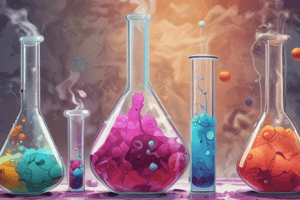Podcast
Questions and Answers
What is the primary characteristic of a synthesis reaction?
What is the primary characteristic of a synthesis reaction?
- A single reactant breaks apart into two or more products.
- A single element or compound reacts with oxygen to release energy.
- A reaction occurs between an acid and a base to form a salt and water.
- Two or more simple substances combine to form a more complex compound. (correct)
What is the result of a combustion reaction?
What is the result of a combustion reaction?
- A salt and water are formed.
- Energy is released through the reaction of a single element or compound with oxygen. (correct)
- A more complex compound is formed from two or more simple substances.
- A complex compound is broken down into simpler substances.
What is the reverse of the synthesis reaction that forms water?
What is the reverse of the synthesis reaction that forms water?
- H2O → H2 + O2 (correct)
- H2 + H2O → O2
- O2 + H2 → H2O
- H2 + O2 → H2O
What is the primary difference between synthesis and decomposition reactions?
What is the primary difference between synthesis and decomposition reactions?
What is a common characteristic shared by synthesis and combustion reactions?
What is a common characteristic shared by synthesis and combustion reactions?
What is the product of a neutralization reaction?
What is the product of a neutralization reaction?
Which type of reaction involves the reaction of a single element or compound with oxygen?
Which type of reaction involves the reaction of a single element or compound with oxygen?
What is the primary difference between synthesis and combustion reactions?
What is the primary difference between synthesis and combustion reactions?
What is the relationship between synthesis and decomposition reactions?
What is the relationship between synthesis and decomposition reactions?
What is the classification of simple chemical reactions that involves the breakdown of a single substance into two or more simpler substances?
What is the classification of simple chemical reactions that involves the breakdown of a single substance into two or more simpler substances?
How many main categories can simple chemical reactions be classified into?
How many main categories can simple chemical reactions be classified into?
Study Notes
Simple Chemical Reactions: Focusing on Synthesis, Decomposition, Combustion, and Neutralization
Synthesis Reactions
Synthesis reactions are those in which two or more simple substances combine to form a more complex compound. Hydrogen, for instance, reacts with chlorine to form hydrochloric acid, as shown in the equation:
[ \ce{H2 + Cl2 → 2HCl} ]
Decomposition Reactions
Decomposition reactions occur when one reactant breaks apart into two or more products. For example, calcium carbonate decomposes into calcium oxide and carbon dioxide:
[ \ce{CaCO3 → CaO + CO2} ]
Combustion Reactions
Combustion reactions involve the burning of a single element or compound with oxygen to release energy. The combustion of hydrogen, shown below, is an example of a combustion reaction:
[ \ce{2H2 + O2 → 2H2O} ]
Neutralization Reactions
Neutralization reactions are those in which an acid and a base react together to form a salt and water. For instance, when hydrochloric acid reacts with sodium hydroxide, the resulting reaction is:
[ \ce{HCl + NaOH → NaCl + H2O} ]
Synthesis and Decomposition Reactions: A Comparison
Decomposition reactions are essentially the reverse of synthesis reactions, as they involve the breakdown of a compound into simpler substances. For example, the decomposition of water into hydrogen and oxygen is the reverse of the synthesis reaction that forms water:
[ \ce{H2O → H2 + O2} ]
Synthesis and Combustion Reactions: A Comparison
Although synthesis and combustion reactions are different in their overall purpose, they share some similarities. Both involve the combination of two or more substances, but the products in combustion reactions are typically more complex than those in synthesis reactions.
Synthesis, Decomposition, Combustion, and Neutralization Reactions: A Summary
In summary, simple chemical reactions can be classified into four main categories: synthesis, decomposition, combustion, and neutralization. These reactions play a crucial role in various chemical processes, from the formation of new substances to the breakdown of complex compounds. Understanding these reactions is essential for comprehending the fundamental principles of chemistry and predicting the outcomes of chemical processes.
Studying That Suits You
Use AI to generate personalized quizzes and flashcards to suit your learning preferences.
Description
This quiz covers the basics of simple chemical reactions, including synthesis, decomposition, combustion, and neutralization reactions. It explains the characteristics of each reaction type and provides examples to illustrate the concepts. Test your understanding of these fundamental chemical reactions!




